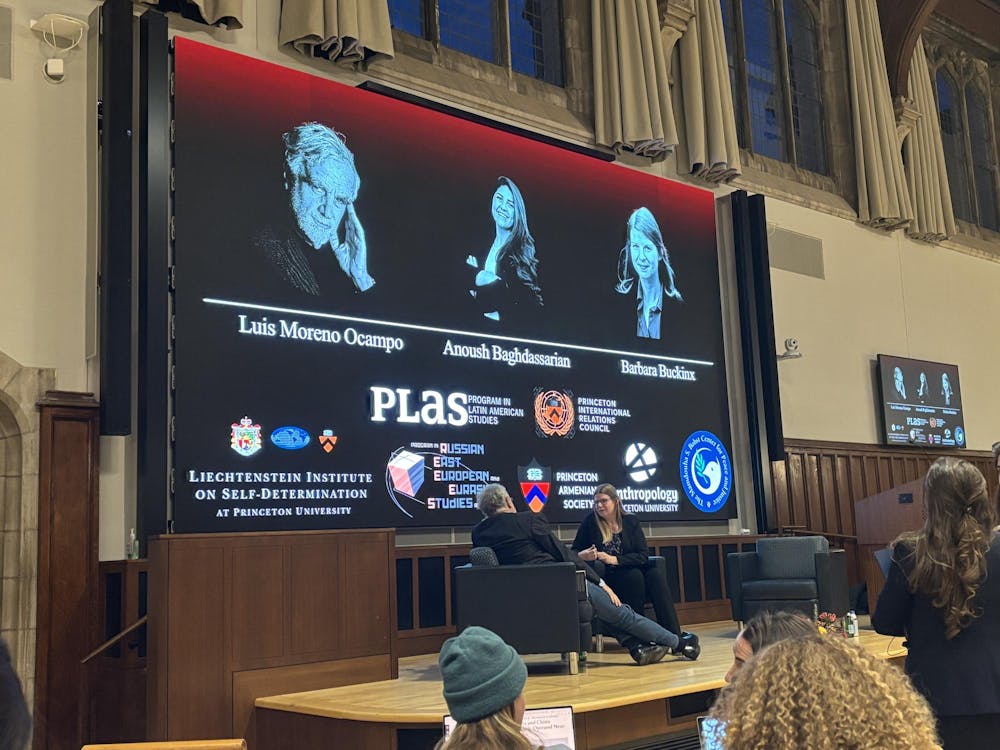On Tuesday, Nov. 19, Princeton students and faculty filled the lower level of McCosh 50 to hear Professor Luis Moreno Ocampo, who is the first chief prosecutor of the International Criminal Court (ICC), and Anoush Baghdassarian, who currently serves as a clerk on the U.S. Second Circuit Court of Appeals, discuss the ICC’s role in securing justice for victims of genocide on a global scale. This scope includes conflicts which have been the focus of student activism, such as wars in Ukraine and Gaza.
The panel-style discussion was moderated by School of Public and International Affairs Lecturer Barbara Buckinx GS ’10 and hosted by the Lichtenstein Institute for Self-Determination (LISD). Before the panel began, event co-organizer Katya Hovnanian ’25, one of the lead student ambassadors of the LISD, spoke to the significance of hosting a discussion on the ICC at Princeton.
“We’re living in a world where international order is kind of in flux, and there is a lack of consensus globally on human rights,” Hovnanian told the ‘Prince’ in a post-event interview.
Hovnanian is a contributing Features writer for the ‘Prince.’
In the face of these circumstances, she expressed that she wanted to bring Ocampo to campus to “bring him into the fold of what we’re doing at Princeton” in terms of human rights work.
Hovnanian introduced Ocampo as the first-ever prosecutor for the ICC as well as the prosecutor for the influential “Trial of the Juntas,” in which several officials from Argentina’s military regime were placed on trial. The trial was the first and only time a nation has prosecuted its leaders for crimes during dictatorship.
The discussion focused on Ocampo’s work, particularly the unique duty of an ICC prosecutor to determine which individuals should be brought under investigation, as well as the important and often difficult task of demonstrating intent to commit genocide during trial.
Baghdassarian and Ocampo spoke about how the prosecutor’s office determined which cases to take on. Baghdassarian said that political pressure could play a role in the prosecutor’s decision, pointing to the case against Putin over alleged ethnic cleansing committed in Ukraine.
“With Ukraine, for example, 43 state parties referred that case to the prosecutor’s office,” she said. “That kind of mass desire for the prosecutor’s resources to go towards an investigation into Ukraine definitely speaks volumes.”
Ocampo explained that due to the high burden of proof needed to establish genocide, prosecutors on the ICC and International Court of Justice (ICJ) have to be discerning when it comes to not only which cases they take on, but also how they prosecute those cases.
He cited the progress made in the ongoing case brought by South Africa against Israel to the ICJ as a prime example. Rather than basing their case on “crimes related to bombing,” he explained, South African attorneys charged Israel with “the most obvious crime” of starvation.
Buckinx asked Ocampo about criticisms that the ICC has faced regarding its efficacy. For Ocampo, the refusal of global powers, such as the United States and Russia, to become states parties to the ICC and fall under its jurisdiction have contributed to the court’s limitations.

“The genuine problem is the U.S. and Russia here, not the court,” Ocampo said.
Baghdassarian, who has worked as a visiting professional on the ICC, discussed international and domestic legal mechanisms connected to the ICC, such as the procedural and enforcement differences between the ICC and ICJ. She specifically noted the difficulty in enforcing international law after these courts come to decisions.
“We saw [this] with the Armenia-Azerbaijan case. Although the ICJ said in its provisional measures that Azerbaijan must unblock the [Lachin] corridor to allow humanitarian aid to go in and out of Nagorno-Karabakh, Azerbaijan did not comply with that provision, and there is not a very good enforcement mechanism when that happens,” Baghdassarian said.
She told the ‘Prince’ in an interview that her goal was to “inform students … about the international legal landscape and the international criminal law landscape and also the landscape of prosecuting those crimes under national jurisdictions.”
Baghdassarian added that she hoped students would come away from the event “know[ing] that there are tools in the international system and in the domestic system that can hold people accountable for heinous crimes, and that they can be inspired to play a big part in that as well.”
When asked what students should take away from his talk, Ocampo told the ‘Prince’ that students “will have to build the system,” and that they should work to “use the digital tools of today to help improve international relations.”
Leela Hensler is a News contributor for the ‘Prince.’
Please send any corrections to corrections[at]dailyprincetonian.com.









